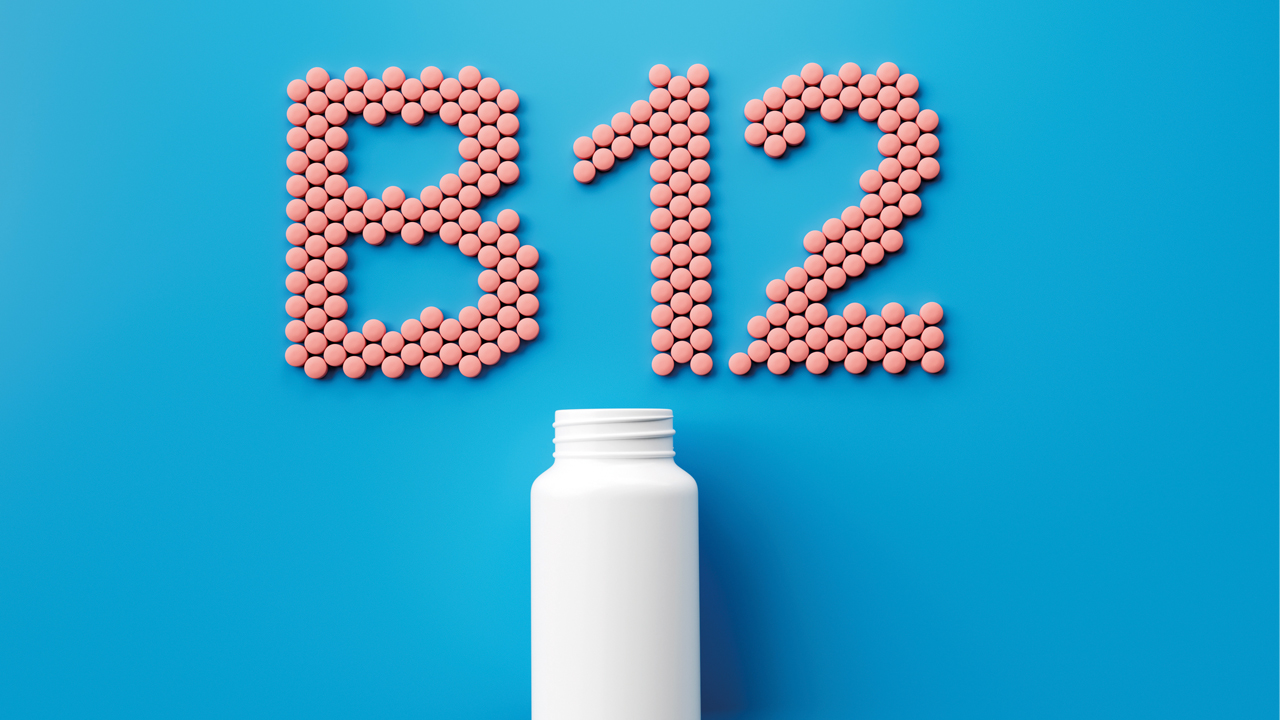In OTC
Follow this topic
Bookmark
Record learning outcomes
When customers ask about vitamins, what’s the first one that springs to mind? Maybe it’s vitamin C to support the immune system, vitamin D for healthy bones and teeth, or vitamin A to help protect eye health. Chances are it’s probably not vitamin B12, even though it plays an important role in keeping the nervous system healthy, making red blood cells, converting our food into energy and using folate.
Food sources of B12 include meat, fish, eggs and dairy produce such as cheese or milk. “The highest sources are found in organ meats (liver and kidney), clams, oysters and sardines,” says registered nutritional therapist Rebecca Pilkington. “Red meat and other fish sources, such as mackerel and salmon, are also good.” Some breakfast cereals or breads may also be fortified with vitamin B12.
Adults aged 19-64 need about 1.5 micrograms of vitamin B12 daily, which they should be able to get by eating a varied and balanced diet, according to the NHS. However, some people suffer from B12 deficiency, which can affect their health in a variety of ways. Potential causes of this can include:
- Pernicious anaemia
- Diet
- Stomach conditions
- Medicines (certain medication such as proton pump inhibitors or metformin can affect B12 levels).
It’s difficult to determine the exact scale of the problem, as some patients may not even realise they have it. But according to a review in The American Journal of Clinical Nutrition, the prevalence of vitamin B12 deficiency (serum B-12 ≤ 150 pmol/L) increased substantially after the age of 69 in three UK surveys, affecting about one in 20 people aged 65-74 years and at least one in 10 of those aged 75+. Meanwhile, another study – published in the British Medical Journal (BMJ) Open – found that 12 per cent of women between the ages of 19-39 were B12 deficient, “despite seemingly adequate B12 intakes”.
Naturally, the sooner the problem can be identified, the sooner it can start to be addressed. Pharmacy teams have a clear role to play in helping to raise awareness in the community, especially among at-risk groups. The good news is that many symptoms can be treated. However, there is a greater chance of complications or permanent damage if the condition is left unchecked, so it’s important that patients seek the help they need without delay.

Requesting a B12 test during a standard blood test is one way of ruling out deficiency.
What are the warning signs?
A lack of vitamin B12 can lead to a wide range of symptoms, and one patient’s experience may be very different to another’s.
“Pernicious anaemia can be a sign of deficiency and typically the symptoms would involve shortness of breath, heart palpitations, dizziness on standing, fatigue,” says Rebecca. “Signs linked to the nervous system include muscle weakness, numbness and tingling in the feet and hands, memory loss and – in the extreme case – dementia.
“B12 is also involved in the digestion process so a lack of this can trigger digestive symptoms including nausea, bloating and weight loss.
“Quick signs you might notice are dandruff, difficulty swallowing, inflammation of the tongue, ringing in the ears and decreased reflexes.”
The onset of symptoms can be very unsettling for those affected, especially as a quick internet search of some of the above can throw up worrying results. Pharmacy teams should direct concerned customers to their GP, who can help to rule out other conditions and arrange for them to have a blood test (also available privately). In some cases, they may be referred to a specialist, such as a dietician, haematologist (e.g. if the patient is pregnant, has neurological symptoms, or does not respond to treatment) or gastroenterologist (e.g if a bowel disorder is suspected).
How you can help
Pharmacy teams can support patients by being “aware of the signs and advising on the underlying causes,” says Rebecca.
Vitamin B12 supplements can be picked up over-the-counter, she adds. “The most effective absorbable form is methylcobalamin. The most common form is cyanocobalamin and this is a cheaper form, but can be less effective for absorption.” With any supplements, always ask about what other medications the patient may be taking and check for any contraindications.
For Kate McKeown, getting her B12 deficiency under control has not only transformed her wellbeing but also sparked a newfound interest in nutrition. “I’ve got a bit obsessed with my health ever since this happened,” she says. “I thought, wow, if that one thing has had such a drastic effect, what else could I change? I figured out that I’m low in quite a few nutrients, which I identified as something to do with my gut, because I eat a very healthy diet. I should be getting these easily from what I eat, but the fact that I’m not suggests there’s an issue with how my body absorbs it. So now I’ve been following a gut-friendly diet to try to heal my gut for the last year or so, and that’s had a huge effect on my energy levels as well.”

There are a variety of ways to boost B12 levels, including with over-the-counter supplements available from the pharmacy.

